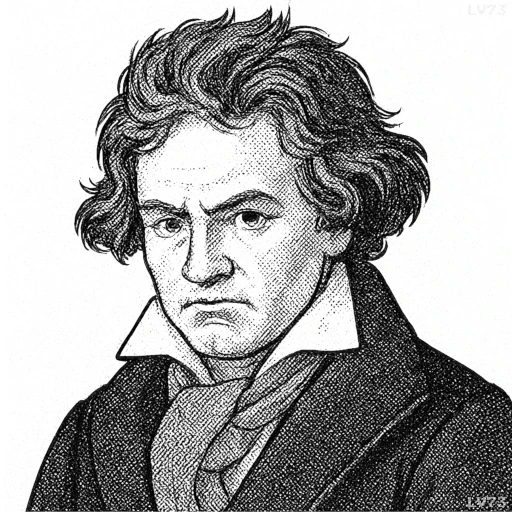“The true artist is not proud: he unfortunately sees that art has no limits; he feels darkly how far he is from the goal, and though he may be admired by others, he is sad not to have reached that point to which his better genius only appears as a distant, guiding sun.”

- December 16, 1770 – March 26, 1827
- Born in Germany (Holy Roman Empire)
- Composer, pianist
table of contents
Quote
“The true artist is not proud: he unfortunately sees that art has no limits; he feels darkly how far he is from the goal, and though he may be admired by others, he is sad not to have reached that point to which his better genius only appears as a distant, guiding sun.”
Explanation
In this quote, Beethoven reflects on the humility and constant striving that characterize the true artist. He points out that the artist is never fully satisfied with their work because art has no limits—there is always more to learn, more to express, and more to create. The artist, in this sense, is constantly aware of the gap between their vision—the ideal they are trying to reach—and their current abilities. Despite external admiration, the artist remains unsatisfied because they know that they have not yet achieved the full potential of their craft. The “better genius” that guides them represents the artist’s higher ideal or ultimate goal, which always seems just out of reach.
This sentiment is deeply rooted in the artistic experience, where the pursuit of perfection is often an endless journey. Artists, composers, and creators frequently struggle with the tension between external validation and internal dissatisfaction. While others may see the beauty in their work, the artist themselves feels a profound yearning for something that transcends their current accomplishments. In the modern world, this is still a common experience, where artists are often their own harshest critics, continually seeking to improve and refine their craft, even in the face of success.
Beethoven’s reflection on the infinite nature of art speaks to the universal experience of artists who, despite recognition, are always looking towards higher standards of expression. This quote emphasizes the personal struggle behind artistic creation—where the pursuit of excellence is often accompanied by a sense of sadness or frustration at the distance between what is imagined and what is achieved. In today’s context, this understanding of art as an endless journey resonates deeply with creators in all fields, encouraging them to embrace their process, knowing that the path to mastery is as valuable as the work itself.
Would you like to share your impressions or related stories about this quote in the comments section?


